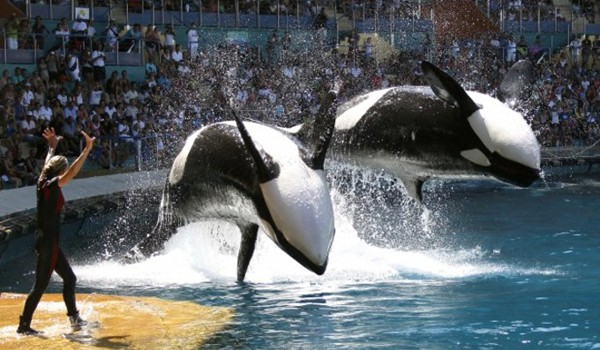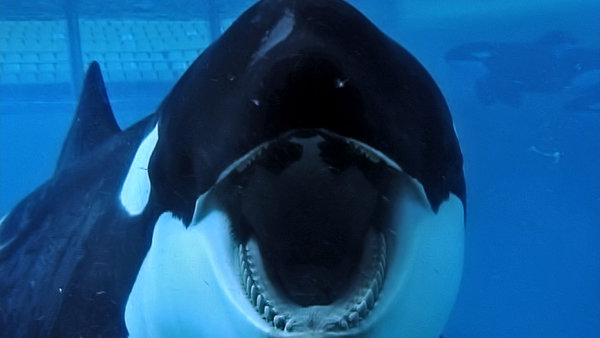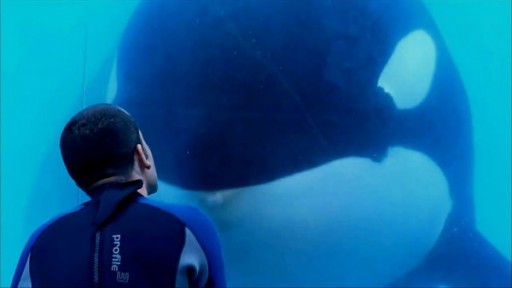Blackfish – Film Review
Reviewed by Damien Straker on November 21st, 2013
Madman Entertainment presents a film by Gabriela Cowperthwaite
Written by: Gabriela Cowperthwaite and Eli B. Despres
Starring: Samantha Berg, Dave Duffus and Dean Gomersall
Running Time: 83 minutes
Rating: M
Release Date: November 21st, 2013
Gabriela Cowperthwaite, the documentary filmmaker of Blackfish, has said her project isn’t to persuade people against animals in entertainment parks. She says it is to make us think about our relationship to them and what we will teach our children because animals are highly emotive creatures. In this context though, and knowing how poorly they’re treated, are these two facets really that inseparable? The film channels its empathy towards mammals by focussing on Tilikum, a twelve thousand-pound male orca whale that was taken from the wild in the early 1980s. It was first captured under brutal circumstances by Sealand of the Pacific, a public aquarium in Canada. Sealand was closed in the 90s after Tilikum had drowned a female trainer. Despite his aggression, he was bought by SeaWorld in Florida and this resulted in the brutal death of a man who snuck in the water park one evening and a popular female trainer, Dawn Brancheau in 2010. Cowperthaite’s investigation uses primary sources, such as people who worked for the aquariums at a young age and also professional whale researchers, to analyse the aggressive behaviour of the whales and the blatant cover-ups from SeaWorld.
A key challenge faced by any documentary filmmaker is balancing both perspectives of their analysis or argument. Late in this documentary, it is revealed that SeaWorld declined to be interviewed. It would have been fascinating to hear their point of view. Outside the film, they eventually responded to the documentary through a CNN interview, claiming to have helped the mammals. Some of their other statements though are total bunkum, arguing that animals don’t need to be able to travel long distances to be healthy. Comments like this are even more ridiculous after seeing the persuasive lengths Cowperthwaite’s interviewees go to in describing the emotions of these creatures. They are characterised here as being more sociable than humans and that they are very capable of experiencing grief, like when an orca is separated from her kind and starts making noises her trainers hasn’t heard before. They have their own languages and a repetiteur of vocals that we can never really understand. Contrary to SeaWorld’s claims that they only live twenty to thirty years, the researchers argue they have a lifespan equivalent of any human being. The film is compassionate in the way that it is about the separation and the understanding of a similar species, which we might not understand but we can still empathise with.
Another significant layer to the documentary is the commercialisation of the aquatic parks. A fascinating discovery is that the young trainers aren’t chosen for having any experience or knowledge of mammals. Alarming, they are hired primarily on their personality and swimming ability. The former trainers interviewed are regretful and sorrowful for being so young and blinded by the facade put up by the parks. There are some hilariously dated advertisements for the water parks cut into film, allowing the parks to posture as a family friendly zone. The seriousness of this facade is expressed through one of the investigations into a trainer’s death. SeaWorld argued that it was Dawn Brancheau’s fault for being killed by the whale because her ponytail was loose but then changed its statements. One of the major accusations is, quite believably, that SeaWorld blames the trainers because they want to preserve the friendly images of the whales. They are the cornerstone and image of their business and financial success. No one would buy a fluffy whale toy if they knew the truth about a whale biting off a man’s genitals or intentionally drowning a trainer by trapping their legs and then dragging them under the water.
The form of the documentary is limited to the interviews and mostly archival footage. It is not the most cinematic documentary but its energy levels lift considerably when we are shown some of the real footage of the whales attacking their trainers. There is a terrifying sequence in which a trainer is pulled under the water several times but since he is an experienced diver he was able to hold his breath for a long period before escaping. The film raises powerful questions about the broader global ethics and culture of SeaWorld, not just in America but other countries like Spain, and the way they treat their staff and wildlife alike. How is it that in various parts of the world they are able to treat both with such disdain? How far are they willing to go to neglect safety and empathy in order to preserve their financial investments? There’s an unexpected amount of emotion and anger to be found in the back-end of the film. It would have been invaluable to hear SeaWorld’s defence front on. We’re left as disorientated as some of the people who knew these victims and trained Tilikum.
Summary: There's an unexpected amount of emotion and anger to be found in the back-end of the film.









